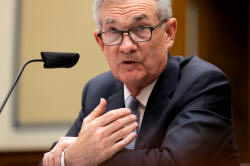Seven months and ticking, the case for keeping Powell as Fed chair
builds
 Send a link to a friend
Send a link to a friend
 [July 14, 2021] By
Howard Schneider, Ann Saphir and Trevor Hunnicutt [July 14, 2021] By
Howard Schneider, Ann Saphir and Trevor Hunnicutt
WASHINGTON (Reuters) - With the U.S. Federal Reserve in the
midst of a complicated policy shift, central bank watchers see a
renomination of Jerome Powell to a second 4-year term as Fed chief as
increasingly likely, a view bolstered by Powell's standing within the
Biden administration and a closely divided Senate.
The Fed chair's current term expires in February, and advisers to
President Joe Biden say he has not yet decided whether to reappoint
Powell, a private equity lawyer named to the Fed's Board of Governors by
Barack Obama and promoted to the top job by Donald Trump.
But a range of factors appear to tilt in his favor, with many Democratic
economists supporting Powell's shift to a more jobs-focused monetary
policy during a turbulent period for the labor market.
On Powell's broader economic record, two senior Biden administration
officials told Reuters they are pleased with his handling of the
pandemic recovery, acknowledgment of the economic support provided by
Biden's fiscal program, and management of an increasingly challenging
inflation scene.

Moreover, with roughly half a year remaining in Powell's term, little
evidence has emerged suggesting Biden plans a switch - and face the
market risk of doing so - at a sensitive moment for the economy.
Also notable is that prior Fed leadership handovers have come amid
relative certainty over the policy outlook, not on the cusp of
potentially disruptive decisions such as when to phase out crisis-era
bond purchases or how to confront a potentially lasting jump in
inflation.
Graphic: Powell's policy transition : https://graphics.reuters.com/USA-FED/CHAIR/dgkvlremqvb/chart.png
"Having uncertainty about who the next chair will be directly translates
into policy uncertainty, which in turn results in market uncertainty,"
said Cornerstone Macro analyst Roberto Perli. Powell's colleagues "may
be less inclined to take cues from a chair that may or may not be there
in a few months."
"If he is a lame duck you are kind of in no man's land for quite a
while," said George Washington University political scientist and Fed
historian Sarah Binder. "And the question is who can be confirmed? I
don't see someone more dovish on monetary policy who would automatically
and easily command 50 votes. And my guess is (Biden) is looking for a 70
or 80 vote confirmation."
Graphic: Holdings steady: https://graphics.reuters.com/USA-FED/CHAIR/oakvedlqkpr/chart.png
ON THE HILL
Powell appears on Capitol Hill this week for the twice-a-year
congressional review of monetary policy and the economy, including a
Thursday hearing before the Senate Banking Committee.

Chaired by Democratic Senator Sherrod Brown of Ohio, the committee is
the first stop in the confirmation process for whoever Biden names in a
100-member Senate divided equally between Democrats and Republicans. Any
concerted stand against Powell by leading Democrats on the panel would
mean trouble for him.
While Brown and Senator Elizabeth Warren of Massachusetts have
criticized Fed moves to ease bank regulation during the Trump
administration, that may have its own solution. The leadership term of
the Fed's vice chair for regulation, Trump appointee Randal Quarles,
expires in October, giving Biden a way to influence bank oversight
separate from the decision on Powell.
Vice Chair Richard Clarida, who helped set the stage for the Fed's new
framework, would leave office at the end of January unless reappointed.
Another seat on the 7-member Fed board, currently vacant and with a term
expiring in January next year, would be open as well.
[to top of second column] |

Federal Reserve Chair
Jerome Powell testifies during a U.S. House Oversight and Reform
Select Subcommittee hearing on coronavirus crisis, on Capitol Hill
in Washington, U.S., June 22, 2021. Graeme Jennings/Pool via
REUTERS/File Photo

A person familiar with Brown's thinking said his priority is using the available
spots to toughen up on Wall Street and increase diversity on an all-white Fed
board.
Meanwhile, two Republicans on the Senate panel, Thom Tillis of North Carolina
and Steve Daines of Montana, told Reuters they support Powell for a second term.
A RARE OPPORTUNITY
Some of the core voices in Democratic policy debates echoed the Biden
administration sources' signals of approval for Powell's performance.
"To replace him now would be a signal something is fundamentally wrong, and I
don't think they think that," said Josh Bivens, research director at the
Economic Policy Institute, a pro-labor research group that contributed to the
Fed's debate over how to reshape monetary policy to encourage more employment.
"Powell has made a very big step forward in making the Fed a progressive force."
Others say Biden should think more broadly about the moment, while agreeing that
inertia alone at this point favors Powell.
"It is probably right that is the way it will unfold," with Powell reappointed
as chair and Quarles replaced by "someone with serious alignment" with Biden's
priorities and promise of tougher Wall Street oversight, said Dennis Kelleher,
chief executive of think tank Better Markets.
But "if Powell gets reappointed just because of status quo, inevitability it is
a missed opportunity for the Biden administration to think hard about the rare
opportunity to put a long-term imprint on the leadership of the Fed."
CONSEQUENTIAL MOMENT
The Fed's preference for consensus means its most important decisions are
crafted to withstand personnel changes.
When Powell took over from Janet Yellen in 2018, the path for continued interest
rate increases was well established. When Yellen took over from Ben Bernanke
four years earlier, the winding down of Fed bond buying from the financial
crisis was underway.

Not since Jimmy Carter's presidency in the 1970s has the Fed's leadership been
up for change at a time of broad policy uncertainty.
By the end of the year the Fed is expected to decide how to wind down its $120
billion in monthly bond purchases, and along the way assess whether a current
bout of inflation proves as short-lived as expected - issues that could test the
credibility of any Fed chair, particularly one that could be on the way out.
Howard University and AFL-CIO economist William Spriggs, a possible candidate
himself for the open board seat, said the absence of clear trial balloons or
leaks, just seven months before Powell's terms ends, means that either the Biden
administration is exceptionally good at withholding information, or inclined
towards continuity.
"If they aren't going to renominate, given the dysfunction in the Senate, you'd
have to tell us" in time to build the case for a replacement, he said.
(Reporting by Howard Schneider; Editing by Dan Burns and Andrea Ricci)
[© 2021 Thomson Reuters. All rights
reserved.] Copyright 2021 Reuters. All rights reserved. This material may not be published,
broadcast, rewritten or redistributed.
Thompson Reuters is solely responsible for this content.
 |